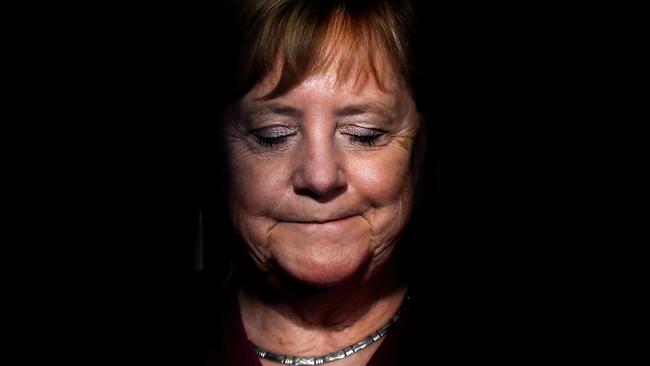Angela Merkel clings on despite a bloody nose in key state election
A crucial state election has given stinging rebuff to Angela Merkel in Germany. It’s a fresh blow to a ruling party in crisis.

Angela Merkel appeared to have narrowly survived one of the toughest tests of her 13 years in office on Sunday night, with her party forecast to cling on to power after a critical state election.
Snap polls suggested that the Christian Democratic Union (CDU) had lost more than a quarter of its vote in Hesse but may have held on to enough support to scrape together a ruling coalition with the Greens.
The election in one of Germany’s most prosperous states had ballooned into a personal test of the chancellor’s authority after months of civil war in her government.
The result was a stinging rebuff for both of the heavyweight parties in the grand coalition. The CDU was expected to win about 28 per cent of the vote, down from 38 per cent at the previous election five years ago. The Social Democratic Party (SPD) was also on course to take a punishing blow, with early surveys indicating that it had plunged from 31 per cent to 20 per cent, and was neck and neck with the Greens in the race for second place.
The election was the first in which the far-right Alternative for Germany (AfD) party achieved a parliamentary foothold in each of the country’s 16 states. Germany’s political map, once dominated by the centre-right CDU and the centre-left SPD, has fragmented into a much more complex and unruly landscape over the past six months.
The AfD, which campaigns in increasingly strident tones against migration and social liberalism, has established a beachhead with about 13 per cent of the vote in Hesse and 16 per cent across the country.
At the other end of the spectrum, the Green party has established itself as the rising power of the left wing and is now threatening to displace the SPD as the main rival of the CDU.
Against these forces, Mrs Merkel’s party seems to have shored up just enough support to avert a catastrophe in Hesse. Volker Bouffier, its chief minister in the state and a staunch Merkel ally, is hopeful of renewing his ruling alliance with the Greens, possibly with backing from the liberal Free Democrats.
“Tonight is an evening of very mixed feelings,” Mr Bouffier said. “We have suffered heavy losses and that makes us humble, but we have achieved two goals — we are the strongest force and no government can be formed against the CDU.”
The danger remains for Mrs Merkel that the SPD will pull out of her government to rebuild itself in opposition, possibly provoking a snap general election.
The once-powerful party has collapsed to 15 per cent of the vote in national polls, and the losses in Hesse have compounded the sense of gathering decline. “This is a heavy and bitter evening,” Thorsten Schafer-Gumbel, the SPD’s leader in Hesse, said. Karl Lauterbach, deputy head of the SPD’s parliamentary group, tweeted that the result was “a clear vote against the grand coalition”.
The party’s leadership will meet at the weekend to discuss what it can do to revive its fortunes. In an interview with The Times last week, Lars Klingbeil, the SPD general-secretary, hinted that change was afoot and said the “decisive thing” would be whether the coalition could find a new way of doing business.
“For me, renewal is really about developing new ideas for the society of the future, but it is also a matter of political style,” he said. “I want to fashion a politics where I can bind in many of our members, where many members can have their say, and not one where I take decisions with two or three people in a back room in Berlin.”
— The Times


